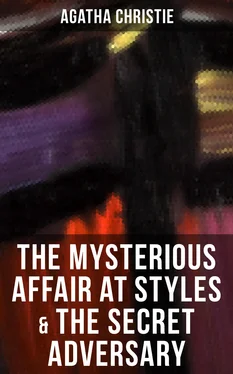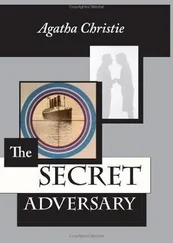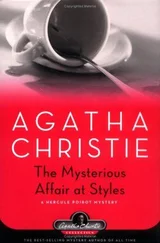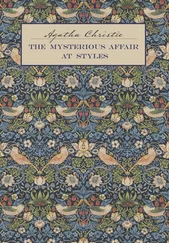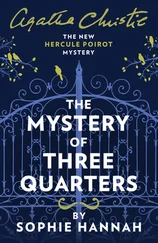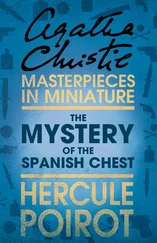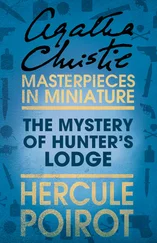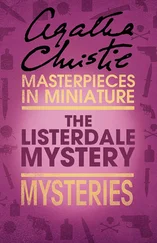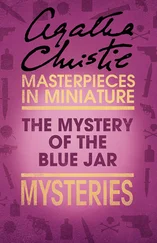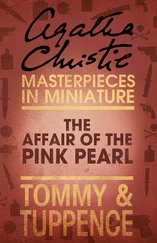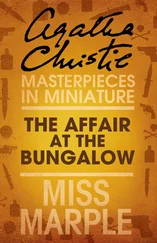“Does anything in your examination lead you to determine how the poison was administered?”
“No.”
“You arrived at Styles before Dr. Wilkins, I believe?”
“That is so. The motor met me just outside the lodge gates, and I hurried there as fast as I could.”
“Will you relate to us exactly what happened next?”
“I entered Mrs. Inglethorp’s room. She was at that moment in a typical tetanic convulsion. She turned towards me, and gasped out: ‘Alfred—Alfred——’ “
“Could the strychnine have been administered in Mrs. Inglethorp’s after-dinner coffee which was taken to her by her husband?”
“Possibly, but strychnine is a fairly rapid drug in its action. The symptoms appear from one to two hours after it has been swallowed. It is retarded under certain conditions, none of which, however, appear to have been present in this case. I presume Mrs. Inglethorp took the coffee after dinner about eight o’clock, whereas the symptoms did not manifest themselves until the early hours of the morning, which, on the face of it, points to the drug having been taken much later in the evening.”
“Mrs. Inglethorp was in the habit of drinking a cup of coco in the middle of the night. Could the strychnine have been administered in that?”
“No, I myself took a sample of the coco remaining in the saucepan and had it analysed. There was no strychnine present.”
I heard Poirot chuckle softly beside me.
“How did you know?” I whispered.
“Listen.”
“I should say”—the doctor was continuing—“that I would have been considerably surprised at any other result.”
“Why?”
“Simply because strychnine has an unusually bitter taste. It can be detected in a solution of 1 in 70,000, and can only be disguised by some strongly flavoured substance. Coco would be quite powerless to mask it.”
One of the jury wanted to know if the same objection applied to coffee.
“No. Coffee has a bitter taste of its own which would probably cover the taste of strychnine.”
“Then you consider it more likely that the drug was administered in the coffee, but that for some unknown reason its action was delayed.”
“Yes, but, the cup being completely smashed, there is no possibility of analyzing its contents.”
This concluded Dr. Bauerstein’s evidence. Dr. Wilkins corroborated it on all points. Sounded as to the possibility of suicide, he repudiated it utterly. The deceased, he said, suffered from a weak heart, but otherwise enjoyed perfect health, and was of a cheerful and well-balanced disposition. She would be one of the last people to take her own life.
Lawrence Cavendish was next called. His evidence was quite unimportant, being a mere repetition of that of his brother. Just as he was about to step down, he paused, and said rather hesitatingly: “I should like to make a suggestion if I may?”
He glanced deprecatingly at the Coroner, who replied briskly: “Certainly, Mr. Cavendish, we are here to arrive at the truth of this matter, and welcome anything that may lead to further elucidation.”
“It is just an idea of mine,” explained Lawrence. “Of course I may be quite wrong, but it still seems to me that my mother’s death might be accounted for by natural means.”
“How do you make that out, Mr. Cavendish?”
“My mother, at the time of her death, and for some time before it, was taking a tonic containing strychnine.”
“Ah!” said the Coroner.
The jury looked up, interested.
“I believe,” continued Lawrence, “that there have been cases where the cumulative effect of a drug, administered for some time, has ended by causing death. Also, is it not possible that she may have taken an overdose of her medicine by accident?”
“This is the first we have heard of the deceased taking strychnine at the time of her death. We are much obliged to you, Mr. Cavendish.”
Dr. Wilkins was recalled and ridiculed the idea.
“What Mr. Cavendish suggests is quite impossible. Any doctor would tell you the same. Strychnine is, in a certain sense, a cumulative poison, but it would be quite impossible for it to result in sudden death in this way. There would have to be a long period of chronic symptoms which would at once have attracted my attention. The whole thing is absurd.”
“And the second suggestion? That Mrs. Inglethorp may have inadvertently taken an overdose?”
“Three, or even four doses, would not have resulted in death. Mrs. Inglethorp always had an extra large amount of medicine made up at a time, as she dealt with Coot’s, the Cash Chemists in Tadminster. She would have had to take very nearly the whole bottle to account for the amount of strychnine found at the post-mortem.”
“Then you consider that we may dismiss the tonic as not being in any way instrumental in causing her death?”
“Certainly. The supposition is ridiculous.”
The same juryman who had interrupted before here suggested that the chemist who made up the medicine might have committed an error.
“That, of course, is always possible,” replied the doctor.
But Dorcas, who was the next witness called, dispelled even that possibility. The medicine had not been newly made up. On the contrary, Mrs. Inglethorp had taken the last dose on the day of her death.
So the question of the tonic was finally abandoned, and the Coroner proceeded with his task. Having elicited from Dorcas how she had been awakened by the violent ringing of her mistress’s bell, and had subsequently roused the household, he passed to the subject of the quarrel on the preceding afternoon.
Dorcas’s evidence on this point was substantially what Poirot and I had already heard, so I will not repeat it here.
The next witness was Mary Cavendish. She stood very upright, and spoke in a low, clear, and perfectly composed voice. In answer to the Coroner’s question, she told how, her alarm clock having aroused her at 4.30 as usual, she was dressing, when she was startled by the sound of something heavy falling.
“That would have been the table by the bed?” commented the Coroner.
“I opened my door,” continued Mary, “and listened. In a few minutes a bell rang violently. Dorcas came running down and woke my husband, and we all went to my mother-in-law’s room, but it was locked——”
The Coroner interrupted her.
“I really do not think we need trouble you further on that point. We know all that can be known of the subsequent happenings. But I should be obliged if you would tell us all you overheard of the quarrel the day before.”
“I?”
There was a faint insolence in her voice. She raised her hand and adjusted the ruffle of lace at her neck, turning her head a little as she did so. And quite spontaneously the thought flashed across my mind: “She is gaining time!”
“Yes. I understand,” continued the Coroner deliberately, “that you were sitting reading on the bench just outside the long window of the boudoir. That is so, is it not?”
This was news to me and glancing sideways at Poirot, I fancied that it was news to him as well.
There was the faintest pause, the mere hesitation of a moment, before she answered: “Yes, that is so.”
“And the boudoir window was open, was it not?”
Surely her face grew a little paler as she answered:
“Yes.”
“Then you cannot have failed to hear the voices inside, especially as they were raised in anger. In fact, they would be more audible where you were than in the hall.”
“Possibly.”
“Will you repeat to us what you overheard of the quarrel?”
“I really do not remember hearing anything.”
“Do you mean to say you did not hear voices?”
“Oh, yes, I heard the voices, but I did not hear what they said.” A faint spot of colour came into her cheek. “I am not in the habit of listening to private conversations.”
Читать дальше
